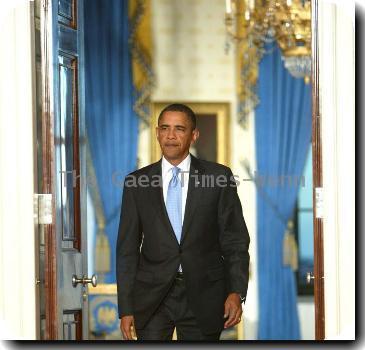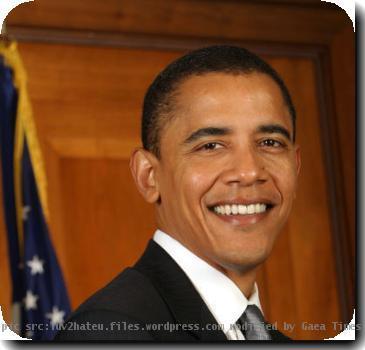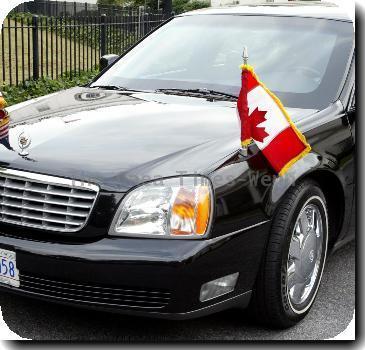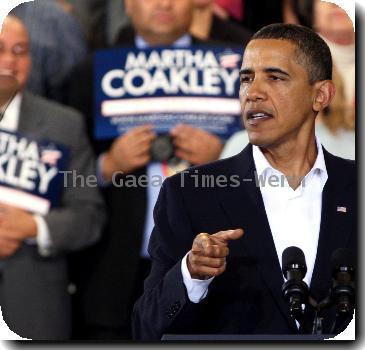Obama seeks tighter control of derivatives, promises no new bank bailout bill
By Charles Babington, APWednesday, April 14, 2010
Obama calls for tighter control of derivatives
WASHINGTON — President Barack Obama said Wednesday that Democrats’ efforts to regulate Wall Street will not result in new public bailouts of banks, as Republicans have charged.
Obama also said he wants greater federal oversight of derivatives — investment products that contributed to the nation’s financial meltdown.
The president met with House and Senate leaders of both parties to discuss legislation revamping regulation of the financial industry. The Senate is beginning to debate the measure amid sharp partisan differences.
Senate Republican Leader Mitch McConnell of Kentucky, who sat two chairs from Obama in the White House Cabinet Room, delivered a speech earlier Wednesday saying the administration-backed bill would perpetuate bailouts for Wall Street rather than end them.
Obama, speaking briefly to reporters before the closed meeting began, said he was “absolutely confident that the bill that emerges is going to be a bill that prevents bailouts. That’s the goal.”
“If there’s one lesson that we’ve learned,” he said, “it’s that an unfettered market where people are taking huge risks and expecting taxpayers to bail them out when things go sour is simply not acceptable.”
He called for “a strong mechanism to regulate derivatives.” Obama also said the complex investment packages exist “in the shadow economy” and are “enormously risky.”
“We want to get that into daylight,” he said.
Derivatives are contracts used to hedge risk or speculate on the future value of assets. The most problematic derivatives from 2008 and 2009 involved mortgage loans that went into default.
After the meeting, McConnell was unmoved. He still insisted that the Senate bill “will lead to endless taxpayer bailouts of Wall Street banks.”
That was the message he delivered earlier on the Senate floor — the second such attack on the bill in as many days. He said the White House plans the same approach on financial reforms that it took on health care: “Put together a partisan bill, then jam it through on a strictly partisan basis.”
White House economist Austan Goolsbee dismissed the GOP objections as “totally disingenuous.”
“Bailouts are forbidden,” he said in an interview. “There will only be wipeouts. They (the banks) will clean up the messes. If somebody fails, they’re done — they’re toast. The management is fired. They’re broken up or sold off or liquidated.”
Goolsbee added the GOP broadside was “pretty cheeky of the Republican leadership,” and an effort to divert attention from its efforts to stop regulation of the derivatives market. “They’re trying to dramatically weaken and put loopholes into that derivatives regulation,” he said.
Sen. Christopher Dodd, chairman of the Senate Banking Committee, has been working for months with the committee’s top Republican, Sen. Richard Shelby of Alabama, and more recently with Sen. Bob Corker of Tennessee, to seek bipartisan agreement on the bill. The efforts have not yielded full agreement, but the bill the Banking Committee approved on a party-line vote last month contained several provisions that were the fruit of those negotiations.
On Wednesday, however, Dodd angrily accused Republicans of “political chicanery” and appeared on the verge of abandoning talks.
“My patience is running out, my patience is running out,” he said from the Senate floor. “I’m not going to continue doing this if all I’m getting from the other side is the suggestions somehow that this is a partisan effort.”
Asked after the White House meeting whether it was time for Dodd to abandon efforts to negotiate with Shelby, Reid said: “We’re going to move on the bill very quickly. They can offer all the amendments they want on the floor.”
Republicans think they continue to score huge points with voters by opposing the health care overhaul that narrowly passed Congress with no GOP votes. They are taking a similar approach on financial regulations. Democrats say Republicans are sympathetic to Wall Street tycoons rather than average Americans.
Democrats need at least one Senate Republican vote to overcome procedural hurdles facing the bill. Democrats and the administration, in public and in private, have expressed confidence that they will have the votes.
The White House says GOP lawmakers are using campaign strategist talking points to label the legislation as a bank bailout, regardless of the truth.
The legislation would set up a mechanism whereby large, intertwined financial institutions would be dismantled much in the same way the Federal Deposit Insurance Corp. takes over failing commercial banks. It would require large institutions to pay into a $50 billion fund that would pay for at least some of the costs of taking down a giant firm. Democrats and advocates of the proposal say it is designed to liquidate firms, not to prop them up.
Republicans maintain that despite such a fund, taxpayers could still be on the hook. They prefer letting failing firms go through bankruptcy court.
–
Associated Press reporters Jim Kuhnhenn, Mark S. Smith and Erica Werner contributed to this report.
Tags: Barack Obama, Congress, District Of Columbia, Government Regulations, Health Care Reform, Industry Regulation, North America, Political Issues, Political Organizations, Political Parties, United States, Us-obama, Washington








